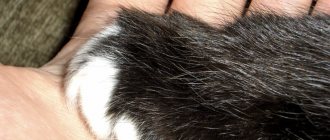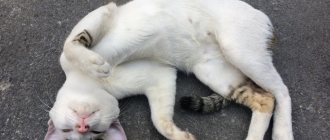The cat chews everything, what should I do?
You can also use a spray bottle of water, sprinkling it on the cat while biting.
This behavior is due to several reasons:
- Designation of your territory. Young cats imitate the behavior of adults in this way. This is instinct, this is how they mark their territory. In this case, weaning the cat from the addiction is relatively simple.
- Changing teeth. By chewing things, the cat satisfies the need to scratch its gums and relieve itching. A visit to the veterinarian will help eliminate this phenomenon. He will tell you what is best to feed your pet to help him.
- Need for attention. Having noticed that the cat is chewing things, you need to use gentle methods of education in relation to it, and caress it more. You should also monitor his well-being and contact a veterinarian if necessary.
How to stop a cat from chewing
To wean an animal from this habit, you should:
What not to do in the process of education
In the process of weaning a cat from the habit of biting, it is important to avoid common mistakes:
- You can't hit a cat. You can scold her in a stern voice and leave her alone for a while. The cat will understand that biting its owner's hand or leg is unacceptable. And physical violence will embitter the animal even more.
- Prohibitions must be observed by all family members. If the owner is trying to wean the animal from biting, and the others allow the pet to behave this way, you should not expect success.
- You cannot deliberately provoke a cat. Don't tease her on purpose. After all, if you punish her after that, she will be completely confused.
You can’t deliberately give a cat fingers to bite, otherwise you’ll never wean it off.
- Do not play with your cat without special equipment. You can use toys that exclude direct contact: laser pointers, wind-up mice, bows on strings. You cannot use your own hands and feet. Otherwise she will get used to biting.
- You cannot limit your pet's movement. In order to develop properly, a cat must run, jump, and imitate hunting. The lack of such an opportunity and being forced to stay within four walls cause behavioral anomalies.
Your cat may be marking you
You already know that you belong to your cat - this is not something you can deny. This way, the cat can leave its scent on you, as if you were rubbing its chin and cheeks. Let this be a warning to all the other cats around - you are their own person, not a stranger!
Cats mark their territory in different ways. They have glands on their cheeks, paws and sides that they can use to rub against objects and other creatures. Friction against the legs indicates the shape of the markings.
This act is a great form of communication for our feline friends. So, if you put your cat in the nest and they rub or "hit" you and bite your nose, they are probably just letting you know that you belong to them. Who doesn't want to be a pet cat?
How to understand when to take up parenting
Signs of aggression in cats can manifest themselves in different ways. For example, the habit of suddenly throwing yourself to your feet. Sometimes the owners do not pay attention to this, but this is how the pet demonstrates that it is a dominant individual and has the right to establish its own rules.
Cats perceive the family they live in as a pack. Each member has a specific position in the hierarchy system. If the owners forgave the kitten all the pranks and did not educate him, as the animal grows older, it will occupy an increasingly higher position.
Kittens should not be allowed to grow up in permissiveness.
How to reduce the risk of aggression and raise an affectionate animal
An affectionate animal can only grow up in a caring and loving family. Never, under any circumstances, use physical punishment. Your hands should only be associated with affection.
Try to talk with your pet often and study its habits. If dissatisfaction appears, accompanied by warning signals, do not test his patience, but immediately stop the unpleasant actions.
If a cat grows up next to a child, make sure that the child knows how to handle it carefully. Stop sudden grabbing and squeezing.
Why does a cat bite its owner's legs and attack him?
Cute pets living in our homes can bring not only joy and benefit. Often, a cat is capable of angering its owner with its feline actions or habits. For example, if a cat constantly bites its owner's legs, then this behavior may begin to irritate him. It’s good if this happened once, but what should the owner do if the cat does this every day?
Why does a cat bite its owner's legs?
Why does a cat attack its legs?
Not all cat quirks can be tolerated. But in order to stop your pet from biting, you first need to understand why he behaves this way.
Frequently asked questions about cats
Often cat owners ask questions: why does their pet perform certain actions and what is the reason for this? Here are the answers to some of them.
Why doesn't my pet eat from a bowl, but drags pieces of food onto the floor?
The animal has very sensitive whiskers, and he does not like it when they come into contact with dishes. You can offer your pet a low, wide bowl or accept that he eats from the floor.
Why does an animal crouch when it notices a bird or a mouse?
The main goal of a hunter is to catch prey. To prevent the victim from noticing that they are about to attack her, the cat tries to behave as quietly as possible. She crouches to the ground, camouflages herself in the tall grass and prepares to jump. The muscles are tense, one jump must be enough for her, otherwise the prey will have time to escape.
Why does the mustachioed creature “interrupt” you when you are talking on the phone?
The pet simply does not understand that you are communicating with someone else. He does not see your interlocutor and therefore believes that since you paid attention to him, then you need to say something in response.
Why does a cat sharpen its claws on wallpaper and upholstered furniture?
Firstly, the cat needs to sharpen its claws, and secondly, there are glands between the toes that emit a special aroma. This is how a cat marks its territory.
Why does a sick animal want to hide in a dark corner?
This is due to natural instincts. Sick animals can become easy prey for larger predators. To avoid potential danger, the cat hides as far as possible.
Why does a cat lightly bite its owner?
This is how she shows her love.
Why does a pet love to lick its fur so much?
Because he is clean. But there is another reason - this is how a cat calms its nerves when something has thrown it off balance.
Why does an animal raise its upper lip when it smells something?
In the mouth of cats there is a special Jacobson's organ, which is responsible for the additional sense of smell. If your pet is interested in something, he will want to inhale the exciting aroma as deeply as possible.
Why doesn't the furry beauty like to swim?
Animals usually respond calmly to water, and some may even enjoy taking a bath. However, we must take into account that cats are very sensitive to their freedom. And when they are shoved into a basin or bathtub and forcibly soaped, this “causes outrage.”
If you pet a cat for too long, it may bite. Why?
Every cat has very sensitive areas. Mainly tail, mustache, nose, ears. When a person begins to show increased attention to them, the cat may be patient, but not for long. Then the animal makes it clear that it does not like this kind of treatment.
Why does my pet drink tap water?
Like most animals, cats prefer fresh water. Therefore, tap water attracts them much more than water poured into a bowl.
The cat hides its toys near the feeding area. Why is she doing this?
There are several places in your home that your cat considers his own. Favorite toys should be hidden where, in her opinion, no one will touch them. Encroachment on personal territory can greatly offend a pet.
The cat turns away if you don't pay attention to it for a long time. What is the reason?
The pet perfectly reads your body signals. As soon as you move out of his sight or stop paying attention to him, he loses interest in you and turns away.
The cat brings dead mice and moles to the doorstep. How can I wean her off this?
Perhaps the pet believes that you need to be fed, and gives its prey as a sign of love. Or hides the mouse for the future. Humble yourself and just throw away the “gift” every time it appears in your home. And of course, be proud of your talented hunter.
Why does a cat lick inedible things, such as plastic bags?
This is another way to “taste” smells.
The animal actively buries the food bowl and scratches the floor around it. Why?
Either your pet is trying to hide the food for later, or she is showing you that the food has spoiled or she simply doesn’t like it.
Why does a cat attack a person's legs and bite their heels?
This is due to the desire to hunt. At home, instinct is expressed in harmless play. If the kitten starts biting too hard, let him know that he shouldn't do that.
Why does a cat rub against furniture and legs?
It’s very simple: this is how she marks her personal territory so that a stranger does not encroach on it. At the base of the tail, near the whiskers and between the front paws there are glands, thanks to which the pet leaves its scent on what it considers its property.
Why does a pet “trample” its owner and things?
It has to do with instincts. In early childhood, kittens use similar movements to stimulate an abundant supply of milk. An adult cat expresses its love and satisfaction in this way.
Why does an animal go into the arms of those who don’t really love them?
If a person behaves calmly and does not grab the cat in his arms as soon as he sees it, then she believes that this is a sign of attention. A freedom-loving animal can choose as its idol a person who treats her more than coolly. When a cat comes up to you and lightly bumps its head against your legs, it is showing its love and affection.
Why does a cat lick a person's hair and face?
The love and devotion of a pet is a well-deserved reward for warmth and care.
It is a form of expression of devotion and care. In early childhood, the kitten receives similar signs of attention from its mother. For him, this is normal behavior, an expression of great love.
What causes furry friends to be aggressive?
If a previously affectionate cat suddenly begins to bite, and not only when you stroke her belly, but just like that, for example, on the legs of the owners who are just passing nearby, first of all you should find out the reason for this behavior. After all, if a cat purrs, caresses and at the same time tries to bite, then this is not a sign of aggression. Most often, this is how the animal shows that it loves its owner. But he does it in his own way, like a cat. You've probably noticed that they behave the same way with each other. Therefore, light bites should not be given too much importance.
Most often, domestic cats, according to experts, bite for the following reasons:
- Cats can suddenly change their behavior and start biting due to pain or the development of an internal disease. In this case, you need to seek help from a veterinarian as quickly as possible, especially if the owners notice that their pets are trying to hide in a secluded place. Aggression then manifests itself very clearly if members of the household try to remove their pet from the so-called shelter.
- Fear is another reason for aggression, but as soon as the cause of panic is eliminated, the pet will stop trying to bite or scratch its owner.
- An affectionate pet friend may become aggressive by scratching or biting the owner if the owner unintentionally causes him pain, for example:
- step on the tail;
- pinches his paw in the door;
- will handle the pet incorrectly, which will cause pain in the animal.
Cases of critical aggression
In addition to the situations discussed, uncontrolled aggression is also possible. To repay it, medical intervention is necessary. Otherwise, the animal, which finds itself in an insane state, can cause fatal injuries to people.
Unsatisfied sexual instinct
Neglect of castration and lack of mating can result in a serious problem in the future. Unsatisfied sexual instinct does not go away over the years, but constantly accumulates. As a result, in the middle or end of life, accumulated energy is redirected in a negative direction. Behavioral disorders occur, accompanied by increased nervousness and outbursts of aggression.
20 years ago, my uncastrated 9-year-old cat began to attack me, my mother, and, worst of all, my little sister for no reason. Then there was no money and ample opportunity to study why this happened, all that was left was guesswork. Later, I kept hearing from friends: an uncastrated domestic cat went crazy, caused serious injuries, and had to be euthanized. And a friend of my grandmother almost lost her arm. So castration is humane both in relation to the cat and in relation to others.
The cat has gone crazy - literally
Cat madness is a rare phenomenon in veterinary medicine. In 99% of cases, aggression is associated with psychological trauma, poor upbringing, self-defense or pain. A mental disorder can only be determined using laboratory diagnostics.
If your pet attacks members of your household, make an appointment with a veterinarian. In the absence of pathologies and a stable mental state, he may need a zoopsychologist.
Rabies
The rabies virus is deadly to humans, so it is necessary to clearly know the main signs of its manifestation. When infected, the following is noted:
aggressiveness or apathy;
fear of light and water;
perverted appetite (eating inedible objects).
The patient should be isolated in a separate room to prevent the spread of the virus. There is no cure for this infection. The only way to protect yourself is timely vaccination.
This is the closest point to pressing
Some cats bite and knead when they feel especially cute. They may bite because they feel frisky or simply out of boredom. If so, this may not cause you much concern. However, if they do it too hard, you should stop this behavior.
Your kitten may not understand how hard it is to be too hard. You need to set boundaries by letting them know that they can't bite your face at all. When your cat tries to bite your nose, firmly tell her “no” and keep some distance between the cat and your nose.
© shutterstock
Reasons why a cat bites
Lack of timely socialization. Cats may have trouble accepting affection if they have not had early human contact.
© shutterstock
The participation of people in the life of a kitten in the first 2 months of life helps the animal to perceive them as “its own” in the future. Such a kitten is more favorable to affection and stroking, willingly spends time in the company of people, goes to people's hands and shows less aggression and distrust, and does not bite. If the animal did not have such experience in early childhood, or if it spent most of its life without active communication with people, then learning to be affectionate can take a long time.
Excessively intense or too long stroking. Cats, like people, have their own preferences and personality traits. Some pets are ready to enjoy human company and affection for a long time, while for others a few minutes is an acceptable maximum. It should also be understood that prolonged exposure to one part of the body with the same intensity causes discomfort in any living creature after a certain time. And as a reaction to this, the cat bites.
Painful sensations. Stroking can be not only pleasant, but also painful, as a result of which the cat begins to bite. The reason for this may be :
Your cat is showing affection
Have you ever been petting your buddy and suddenly he grabs you and gently bites your hand? This action is a complete manifestation of affection. They reciprocate your feelings. You may be holding them and your nose is the closest they can come to reacting to.
If you've ever seen two cats interact with each other, you may have noticed this behavior during grooming. Two cats lying together may lick each other and then bite each other gently. This is a good sign. This means that they are completely relaxed, calm and ready for love.
Your cat is warning you
Maybe you're invading their space too much and don't even know it. If they want you to back off, they may bite your nose lightly and then hiss or growl. If your cat shows you that they need space, give them what they want. If you resist the situation, you may actually end up getting bitten or scratched!
Cats can't talk like we do, so if they're fed up with your antics, this is the only way they can communicate. But of course, no animal should bite out of aggression. The best thing to do in this case is to not put you or your kitten in this predicament again.
Remember that animals have boundaries too. Sometimes they are not in the mood to attract attention. Cats are big believers in consent. If they don't want to be domesticated right now, your best bet is to listen to their body language.
How to stop a cat from biting
What to do if a cat bites? Maybe you should just turn a blind eye to such unsightly behavior of your pet? Of course, you should never tolerate animal bites. Here are some tricks that will help stop your cat from biting:
- From an early age, a baby kitten needs to be accustomed to guests at home. People who come must treat the animal with the utmost care, do not shout in front of it, do not grab it in their arms or throw it up;
From the very first days of a kitten’s stay in the house, the baby should have his own toys (balls, mice, fishing rods that you can make with your own hands). But it’s better to avoid playing with the owner’s fingers. A kitten, accustomed to playing with its owner's hands, will not miss the opportunity to gnaw on its fingers;
Cats do not like sharp and loud sounds. If the animal does bite, the owner needs, for example, to hit the glass (table, wall) loudly with his hand or stamp his foot on the floor. The noise effect is worth repeating every time the cat uses its teeth;
Your cat can groom you
We see cats grooming each other all the time. If you are "one of them", they will try to court you too. What they're really trying to do is teach you how to take care of yourself.
You may not know it, but your cat knows that she is smarter than you. That's why they try to teach you basic survival skills. Perhaps your cat left a mouse or bird on your porch. They think you're too stupid to hunt yourself, so they try to feed you.
Similar to this mood, your cat will groom you to teach you how to clean yourself - you are a dirty animal. If your cat bites your nose, it may be a routine cleaning. If it hurts, let them know and move on. Although this type of nose-biting likely won't do any harm.
Final thoughts
Our cats can communicate with us in many ways. Once you get to know your feline friend better, you will be able to easily identify his behavior, which can sometimes be unusual. But if nose biting is a recurring event that is relatively recent, you may need help deciphering it.
As long as your cat isn't showing signs of aggression, nose biting probably won't be that big of a problem. However, if you feel that your cat is struggling to behave badly, consult your veterinarian.
Article Author: Ashley Bates Ashley Bates is a freelance writer and pet lover currently studying the art of animal therapy. A mother of four human children and 23 furry and feathered babies, Ashley volunteers at local shelters, advocates for animal welfare, and rescues every creature she finds. Her mission is to inform and educate about pets to prevent homelessness. Her specialty is cats and dogs.
Source










